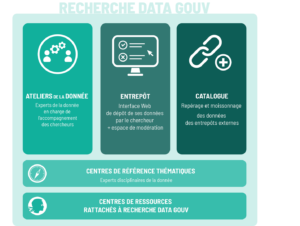Recherche Data Gouv
Recherche Data Gouv is an ecosystem for sharing and opening up research data. It provides research teams with a full support system and an infrastructure for managing, structuring and disseminating the data they produce.
Recherche Data Gouv was designed to provide effective responses to the challenges of opening, sharing and preserving research data. It also supports research teams in their work of structuring data so that it complies with the “FAIR” principles and is thus Findable, Accessible, Interoperable and Reusable. To achieve this, it federates support mechanisms for research teams into a single ecosystem complemented by a trusted technical infrastructure for depositing, opening, sharing and reporting data.
It represents a sovereign solution which enables French research to keep control of the research data it produces and is destined to become the high visibility one-stop-shop for all French research data.
The creation of Research Data Gouv was set out in the Second National Plan for Open Science and has its basis in French Ministry of Higher Education and Research’s policy on the data, algorithms and source codes.
Recherche Data Gouv was designed to respond to the requirements of French research and also aims to be an integral part of an evolving international landscape through the structuring of the European Open Science Cloud (EOSC).
The Recherche Data Gouv ecosystem is made up of five modules:
Three support modules for research teams:
- The data management clusters are geographically situated close to research teams to provide them with initial expertise in rational research data management. They result from a labelling process following recurrent calls for expressions of interest and are managed by universities, écoles and research organisations within the framework of site policies;
- The thematic reference centres disseminate best practices and international standards for data management, processing and dissemination in their respective disciplinary fields. These are supported by national research infrastructures or existing national research organisations. They manage the reference registry of repositories integrated into Recherche Data Gov and ensure effective coordination with specialised disciplinary or thematic systems and the international ecosystem ;
- The resource centres help researchers deposit and publish their research data. As such they complement the platform’s local support by providing online services, teaching support aids and shared training.
Two modules for researchers to deposit, publish and report data:
- A sovereign multidisciplinary repository for all members of all communities that do not have their recognised thematic repository to deposit and publish data sets. It is hosted on a labelled national data centre and includes a moderation space. This repository is organised into institutional spaces for researchers from institutions that wish to be part of the project to publish and report their data;
- A registry for searches for French research data published in the Recherche Data Gouv repository or external repositories whether these are national, international, thematic or disciplinary. This registry will be available in 2023.
This whole ecosystem can be accessed via a one-stop platform – recherche.data.gouv.fr/en

Governance and teams
This project is part of the National Plan for Open Science and is receiving full funding for the first three years from the National Fund For Open Science.
The Open Science Steering Committee is responsible for the project’s governance and has created a dedicated Recherche Data Gouv Steering Committee to act on its behalf. This is chaired by the ministerial data, algorithms and source codes administrator and proposes the overall roadmap, priorities, solutions and means to the Open Science Steering Committee while also making major arbitral decisions. Thus it ensures the overall coherence and direction of the project while reporting directly to the Open Science Steering Committee.
The National Research Institute for Agriculture, Food and Environment (INRAE) was asked to develop the repository and registry modules. To do so the INRAE led a team involving 7 universities and organisations with expertise in terms of data repositories or supporting open research data.




